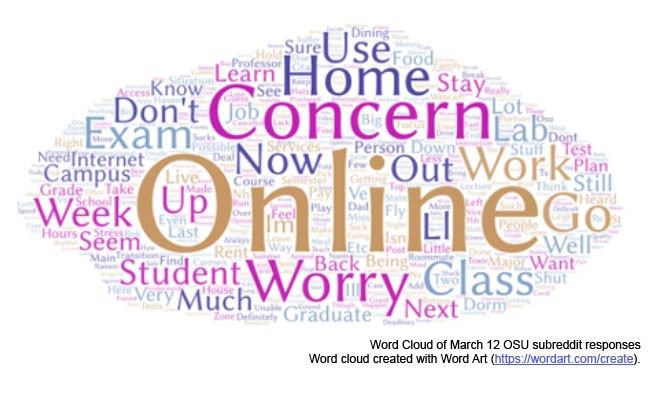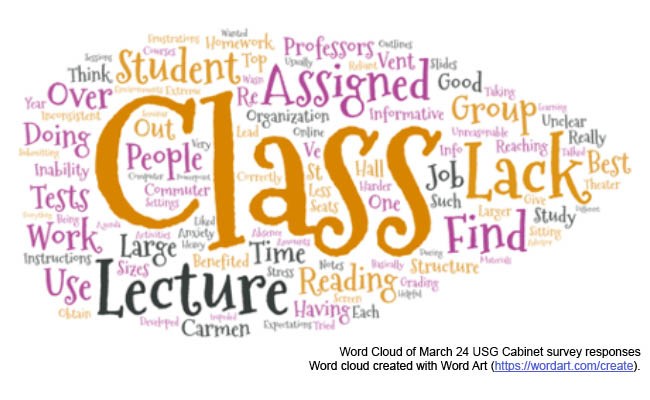Recognizing and Responding to Students’ Concerns about Remote Teaching and Learning
Many of the articles crossing our virtual desktops in the past week or so remind us of the challenges facing faculty as they make the move to remote teaching. Just this morning (March24), for example, Inside Higher Ed published Colleen Flaherty’s “Working from Home during COVIC-19 Proves Challenging for Faculty Members,” which speaks to very real challenges: attending to the needs and health of school-aged and college-aged children (as well as our own), creating and maintaining daily schedules and keeping ourselves accountable, meeting research and teaching productivity expectations, and the financial uncertainties facing part-time and adjunct faculty.
But these challenges—and others as fundamental and perhaps even crippling—face students as well.
Karin Fischer, in her Chronicle piece, “When Coronavirus Closes Colleges, Some Students Lose Hot Meals, Health Care, and a Place to Sleep,” raised an early call for institutions to attend to students’ holistic needs in a time of intense upheaval of every aspect of their lives. Interested in learning first-hand what OSU students were finding most concerning, Associate Professor of English Christa Teston went to them directly, posting on the OSU subreddit page on March 12 to ask what they were worried about.
Christa collected, collated, and anonymized their responses, highlighting predominant concerns. As she noted in a message to colleagues on the English Department listserv, “students are dealing with A LOT right now—from food insecurity to unsafe home environments and uncertainty about whether they can rely on their pay from an on-campus job. Obviously, this isn’t a representative sample of our total student body, but it gives us some idea of what’s going on in their lives.”
The 29-item, 1,900-word list that Christa extracted from the subreddit on March 12 yields this visualization:
 As the word cloud illustrates, students’ concerns range from the academic and technological (making the transition to remote and asynchronous teaching and learning, how exams will be proctored, whether online platforms can sustain increased traffic, accessing digital tools, reliability of their home internet, whether faculty will record and archive livestreamed lectures) to the most basic: food and money.
As the word cloud illustrates, students’ concerns range from the academic and technological (making the transition to remote and asynchronous teaching and learning, how exams will be proctored, whether online platforms can sustain increased traffic, accessing digital tools, reliability of their home internet, whether faculty will record and archive livestreamed lectures) to the most basic: food and money.
One student on the OSU subreddit outlined how all of the digital tools available to them, in fact, complicated their learning:
They’re worried about finances: “Definitely worried about rent now that I'm not working until at least the 31st.” “My main stress is paying rent right now. I work at dining services and it's been a week and I still don't know if I have a job or not, so I just don't know if I can buy groceries or pay rent next month.”
They’re returning to homes in which they feel unsafe and are food insecure, where the “only sure food item in the house is ramen, so the adjustment from eating well on campus to eating ramen is gonna be a little tough.”
Some recognize that they will likely be less productive.
Those from rural areas are concerned about connectivity and whether they’ll be able to access Zoom.
Others have children or younger siblings eager to see them and spend time with them—but who also complicate their ability to attend to their class responsibilities, leading them to acknowledge “all of my assignments and tests will have to be done late at night or very early in the morning”—squeezing their work into less than optimum hours of the day.
Or they worry that they may be putting vulnerable family members at risk by returning home.
They’re concerned about their own health, as well: “I have a sucky immune system and my lungs already don't work well.” We must, frankly, remind ourselves that over the upcoming weeks and months, many of our students and their families are about to be very sick. Some students may even lose family members to this virus
Even those who acknowledge their privileged positions with “reliable internet, enough money to get through this, and academically . . . no worries” still relate concerns. Graduating seniors express disappointment over the likely loss of graduation and the opportunity to walk: “It would be a major, but understandable, disappointment if that had to be cancelled.” Others worry that postponing graduation and granting of degrees will negatively impact job offers, relocation to new cities, leases on new apartments.
Across students’ responses is the refrain that many—even, perhaps especially, graduate students—are just trying to “keep it together.” For GTAs, the stakes and challenges may be even greater: They’re balancing teaching, class, and research obligations:
“Keeping it together” may be the most some students can manage.
REFOCUSING OUR ATTENTION
As I shift from what students are experiencing to what faculty can do to assist them, I want to turn to another recent news and opinion piece from Brandon Bayne (Department of Religious Studies, University of North Carolina-Chapel Hill) who outlines in a Chronicle of Higher Education piece entitled, “‘Nobody Signed Up for This’: One Professor’s Guidelines for an Interrupted Semester,” five basic principles for instructors:
- Nobody signed up for this.
- The humane option is the best option.
- We cannot just do the same thing online.
- We will foster intellectual nourishment, social connection, and personal accommodation.
- We will remain flexible and adjust to the situation.
The themes of the “human option” and striving to “foster intellectual nourishment, social connection, and personal accommodation” are echoed by students on the OSU subreddit as well as students’ responses to a survey distributed in mid-March by the University Institute for Teaching and Learning (UITL) to members of the USG Cabinet.
 In that survey, cabinet members were asked to relate both their own, or others’, “most pressing concerns about learning in this new environments in post-Spring Break 2020” and recommendations for how instructors can facilitate learning. When asked on the Cabinet survey what they would like faculty to know, one student wrote, “I just want them to know that I understand and I hope and believe many students do as well that this is affecting instructors and admin just like it is affecting us. We are all facing unprecedented times and we have got to give each other the decency and respect to work together and come out of this in a positive way for everyone.”
In that survey, cabinet members were asked to relate both their own, or others’, “most pressing concerns about learning in this new environments in post-Spring Break 2020” and recommendations for how instructors can facilitate learning. When asked on the Cabinet survey what they would like faculty to know, one student wrote, “I just want them to know that I understand and I hope and believe many students do as well that this is affecting instructors and admin just like it is affecting us. We are all facing unprecedented times and we have got to give each other the decency and respect to work together and come out of this in a positive way for everyone.”
I’ve incorporated below some of the USG recommendations alongside recommendations or guidelines from AAUP, the OSU College of Arts and Sciences, and scholars contributing to a recent Chronicle compendium on Coping with Coronavirus.
First, as we reflect on what we can do as teachers and mentors, we might turn to and reframe the recommendations Flaherty makes for institutions as they seek to support faculty and apply them to students:
- Recognize that the closure of campuses and their resources, combined with the isolation of social distancing, will likely have a considerable negative impact.
- Shift expectations about productivity and performance.
- Consider the impact of institutional decisions on our most vulnerable populations and act to support those individuals.
Following from Flaherty’s and USG recommendations, I offer these additional encouragements:
Understand the very real impact of the loss of campus to students, acknowledging the third of the AAUP “Principles for Higher Education Response to COVID-19”:
Alert your students to and post to your Carmen site information like that included in the ASC Student Well-being Resources document distributed by Wendy Smooth, associate dean for Diversity, Equity and Inclusion.
Enact an asynchronous pedagogy. Students may not now be available during scheduled class times as they may be living in different times zones or now have to work.
Make your course materials accessible. Students may not be able to reliably access video or audio files via the internet and may rely instead on smartphones to access course content from Carmen, possibly resulting in hefty charges from cell phone companies if they exceed their monthly data limit. (One five-minute video on carmen could easily exhaust a student’s allotted data limit for the month.)
Be sure that if you use items like videos and/or audio, transcripts can be provided for students to simply read (instead of watch). The data required to download a word document is way less than that which is required to download a video.
Listen to your students.
Trust your students.
Reach out to them regularly and consistently.
Connect yourself to colleagues.
Seek resources to support your teaching by accessing Keep Teaching and Keep Learning, as well as other resources such as the Chronicle’s Coping with Coronavirus: How Faculty Members Can Support Students in Traumatic Times can be downloaded (after registration) here.
Share information and strategies with colleagues through “How are you teaching?” on the UITL website. UITL is collecting, curating, and posting innovative solutions, remote teaching tips, recommended methods for engagement, and how instructors are staying connected to and supporting their students and one another.
Join with colleagues in a UITL Community of Practice to discuss common challenges and develop strategies and tools to address those challenges.
Consider encouraging students to post to How are you Learning?, a site through which they can share their best strategies for navigating the next two months and beyond.
Finally, heed the advice of Christopher Long, dean of the College of Arts and Letters at Michigan State University, cited by Flaherty as having written “an email to professors last week on ‘adjusting expectations,’ saying that anything beyond keeping healthy and social distancing and succeeding in remote instruction ‘can wait and should wait.’” Flaherty notes that “Long concludes by writing that ‘it would be unjust to expect business as usual.’”
